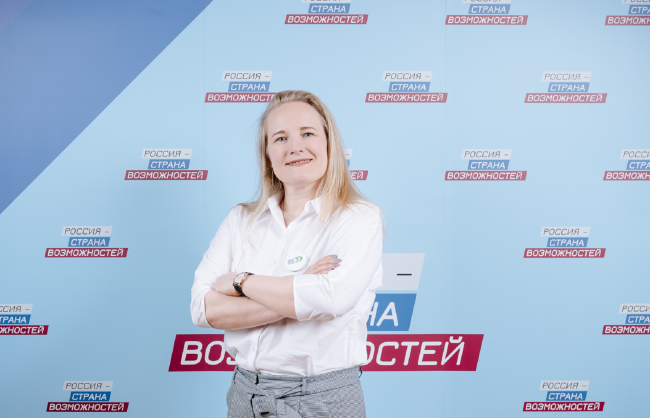Vice-Rector of VyatSU Yekaterina Mityagina spoke about a large-scale study of the national cultural code implemented by a large university team in cooperation with other universities and industrial partners
These days, the phone of the vice-rector for development based on the analysis of data from VyatSU, professor, doctor of sociological sciences, Ekaterina Mityagina, does not stop ringing. The speech of the winner of the Leaders of Russia 2020 competition at a meeting of the supervisory board of the ANO 'Russia - Land of Opportunities', where she told the President of the Russian Federation and other participants of the meeting about a large-scale study of the “mysterious Russian soul”, aroused great interest of Russians and a desire to find out the details of the work being done. Expressing her readiness to inform them, Ekaterina Vladimirovna emphasized:
- I want you to understand that this research is being carried out not by one person, but by a large team. At Vyatka State University, this is, first of all, the Department of Journalism and Integrated Communications; among the project participants are professors Elena Vasilievna Diner, Lyudmila Aleksandrovna Mosunova, Olga Ivanovna Kolesnikova, associate professor Yulia Vyacheslavovna Buldakova. Students also take an active part. In addition to VyatSU, other universities that are part of the Consortium of Big Data Researchers, as well as our industrial partners, are involved in the work: for example, Megaputer Intelligence, whose analytical platform PolyAnalyst we actively use.
Ekaterina Mityagina spoke about the laws governing the origin of the idea of studying the national cultural code.
- We, as teachers of the worldview disciplines of higher education, undoubtedly think about national values, the concepts of patriotism and consolidation. And here the issue of the national cultural code comes forward, the meaning of the study of which lies in the search for national originality, identity, uniqueness of the Russian person. The national code inherent in our mentality is the most important strategic resource of our state and nation, allowing them to maintain their viability.
The code, emphasized E.V. Mityagina, is always the ratio of constancy and variability. The constants have been known to us since the "Tale of Bygone Years" - they pass through all the reference points of Russian literature from Pushkin to Blok, from Blok to Alexei Ivanov. The idea of the Russian world and the Russian emigration is based on them.
To what extent are the values of millennial history reflected today? In search of an answer to this question, the researchers turned to big data that can help understand the psychology and behavioral reactions of the Russian person; ideas that evoke the greatest response in the souls of Russians.
In the course of the pilot phase of the study, an analysis of the responses to the recognized works of art was carried out. More than 150 works were selected, which became in 2000-2020. laureates and winners of such prizes as "Big Book", "Writer of the Year", "Russian Booker", "National Best", "Big Literary Prize", "Yasnaya Polyana", "State Prize", "Patriarch Prize". The project team analyzed hundreds of thousands of reviews - as a result, it was concluded which values at the level of mentality find the greatest response in the soul of a Russian.
- We received a set of values such as collective consciousness, the desire for spirituality and higher justice, the denial of any dissent, the desire to quickly solve life's problems, faith in the future (sometimes utopian), nostalgia for the heroic past, empirical sensory knowledge of the world. And insane love for the Motherland! “The whole world is a foreign land for us,” Pushkin wrote about this. In addition, in the reviews, we found a large number of concepts that are close to every Russian, but not translated into European languages. This is space, freedom, will, comfort, prowess, feat, indifference, restlessness, trouble, melancholy and many others. On the other hand, there are such qualities as irresponsibility, rudeness, severity, backwardness, injustice, looting, envy, anger, -
reported Ekaterina Mityagina. The project leader drew attention:
- And here we are moving from constant values to the variability of the national code. We understand that the values proclaimed, for example, by Russian literature, are not always perceived by young people. This happens, firstly, because the new time gives rise to changes even in the most seemingly conservative constant - such as mentality. Second, young people often simply don’t read. Our research has shown that, at best, young people listen to audiobooks or read films based on films. What is a traditional family? These are mom, dad and three children. But why are there fewer such families today?
E.V. Mityagina noted that a national code, as well as a national idea, cannot be invented. These are complex mental categories that are as constant as they are changeable. They can be understood, filtered, reflected and reinforced through the system of education and upbringing. And in order to understand them, you need to go from the chronicler Nestor through the reference points of Russian history and literature to the present.
- We are all part of the national code. Our strength lies in our identity, originality, and uniqueness. In the center of the national idea, in my opinion, should be the Russian person, his mental and physical health. And a healthy attitude towards each other, a positive beginning in thought with the obligatory transition to business. This is what we should strive for when raising our children, when teaching young people, when talking with the older generation, when understanding our mentality.
Russia has a special mission in the world. And the fate of every Russian person is part of this mission, it is part of the fate of the country and our nation.
Translated by Artemij Sizov
Read in Russian

